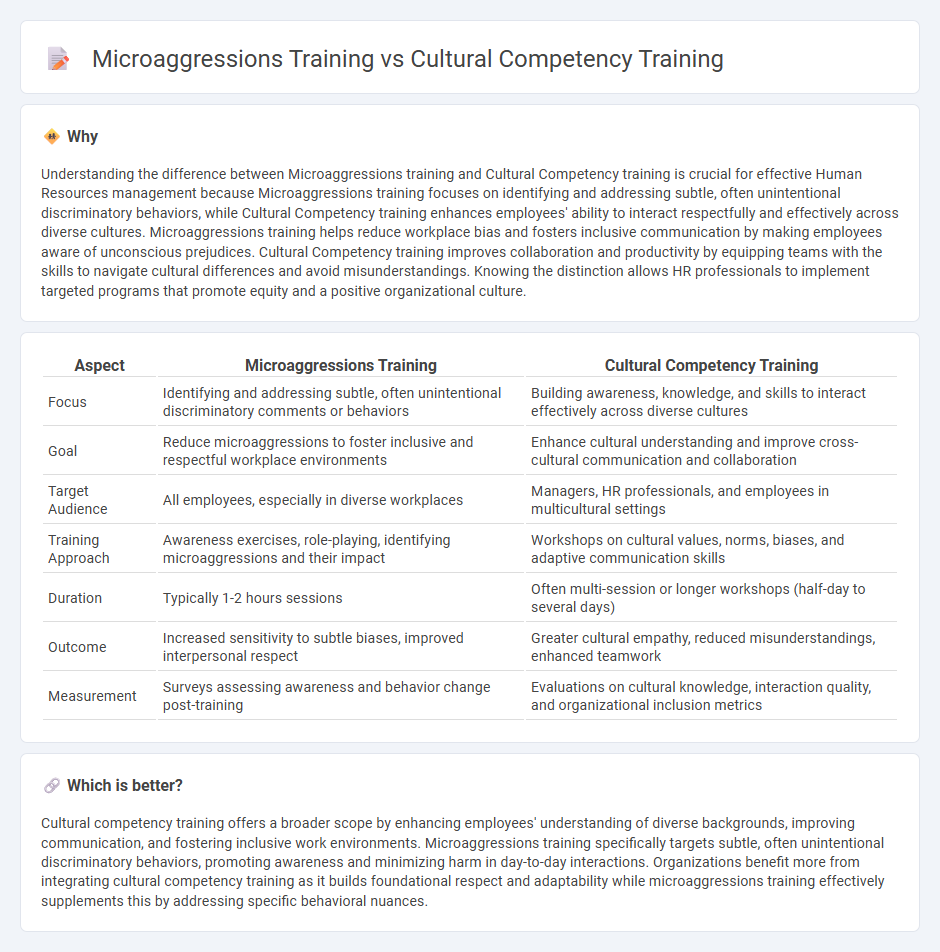
Microaggressions training focuses on identifying and addressing subtle, often unintentional discriminatory behaviors that affect workplace inclusivity and employee well-being. Cultural competency training emphasizes understanding and respecting diverse cultural backgrounds to enhance communication and collaboration among team members. Explore how these targeted training programs can transform your organization's human resources strategies.
Why it is important
Understanding the difference between Microaggressions training and Cultural Competency training is crucial for effective Human Resources management because Microaggressions training focuses on identifying and addressing subtle, often unintentional discriminatory behaviors, while Cultural Competency training enhances employees' ability to interact respectfully and effectively across diverse cultures. Microaggressions training helps reduce workplace bias and fosters inclusive communication by making employees aware of unconscious prejudices. Cultural Competency training improves collaboration and productivity by equipping teams with the skills to navigate cultural differences and avoid misunderstandings. Knowing the distinction allows HR professionals to implement targeted programs that promote equity and a positive organizational culture.
Comparison Table
| Aspect | Microaggressions Training | Cultural Competency Training |
|---|---|---|
| Focus | Identifying and addressing subtle, often unintentional discriminatory comments or behaviors | Building awareness, knowledge, and skills to interact effectively across diverse cultures |
| Goal | Reduce microaggressions to foster inclusive and respectful workplace environments | Enhance cultural understanding and improve cross-cultural communication and collaboration |
| Target Audience | All employees, especially in diverse workplaces | Managers, HR professionals, and employees in multicultural settings |
| Training Approach | Awareness exercises, role-playing, identifying microaggressions and their impact | Workshops on cultural values, norms, biases, and adaptive communication skills |
| Duration | Typically 1-2 hours sessions | Often multi-session or longer workshops (half-day to several days) |
| Outcome | Increased sensitivity to subtle biases, improved interpersonal respect | Greater cultural empathy, reduced misunderstandings, enhanced teamwork |
| Measurement | Surveys assessing awareness and behavior change post-training | Evaluations on cultural knowledge, interaction quality, and organizational inclusion metrics |
Which is better?
Cultural competency training offers a broader scope by enhancing employees' understanding of diverse backgrounds, improving communication, and fostering inclusive work environments. Microaggressions training specifically targets subtle, often unintentional discriminatory behaviors, promoting awareness and minimizing harm in day-to-day interactions. Organizations benefit more from integrating cultural competency training as it builds foundational respect and adaptability while microaggressions training effectively supplements this by addressing specific behavioral nuances.
Connection
Microaggressions training addresses subtle, often unintentional discriminatory behaviors that negatively impact workplace inclusion and employee well-being, while cultural competency training enhances understanding and respect for diverse backgrounds and perspectives. Both trainings synergistically improve organizational climate by promoting empathy, reducing bias, and fostering effective communication across diverse teams. Integrating these programs in Human Resources strategies leads to a more inclusive, equitable workplace culture and increases employee engagement and retention.
Key Terms
**Cultural competency training:**
Cultural competency training enhances employees' ability to understand, communicate, and effectively interact with people across diverse cultures by addressing biases, values, and customs. It promotes inclusive workplace environments, reduces misunderstandings, and improves teamwork and customer satisfaction. Discover how cultural competency training can transform your organization's diversity and inclusion efforts.
Cultural awareness
Cultural competency training emphasizes developing an in-depth understanding of diverse cultural backgrounds to improve communication and reduce biases, fostering respectful interactions in multicultural settings. Microaggressions training focuses on recognizing subtle, often unintentional offenses that marginalize individuals, aiming to increase awareness and promote inclusive behavior. Explore comprehensive approaches to cultural awareness and how these trainings complement each other for effective diversity education.
Cross-cultural communication
Cultural competency training emphasizes building skills for effective cross-cultural communication by increasing awareness, knowledge, and sensitivity towards diverse cultures. Microaggressions training specifically addresses subtle, often unconscious remarks or behaviors that can negatively impact individuals from marginalized groups, aiming to reduce these instances within workplace interactions. Explore further to understand how both approaches enhance inclusive communication strategies.
Source and External Links
What Is Cultural Competency Training? | Aspiring to Include - Cultural competency training is a structured education program designed to improve understanding and sensitivity toward diverse cultures by teaching learners to communicate effectively and respectfully across cultural boundaries, through immersive workshops, role-plays, and experiences that build empathy and self-awareness.
Cultural Competence Training - Traliant - Traliant offers a 30-minute online course introducing employees and managers to the importance of cultural competence, covering practical strategies to avoid misunderstandings, foster respect, and communicate effectively across cultures, with modules on cultural norms, workplace diversity, and actionable steps for inclusive interactions.
Cultural Competence | NEA - National Education Association - The National Education Association provides 3- and 4-hour training sessions for educators, focusing on culturally responsive teaching, diversity and inclusion, and strategies to promote academic success for students from all backgrounds, with activities that deepen cultural self-awareness and instructional skills.
 dowidth.com
dowidth.com